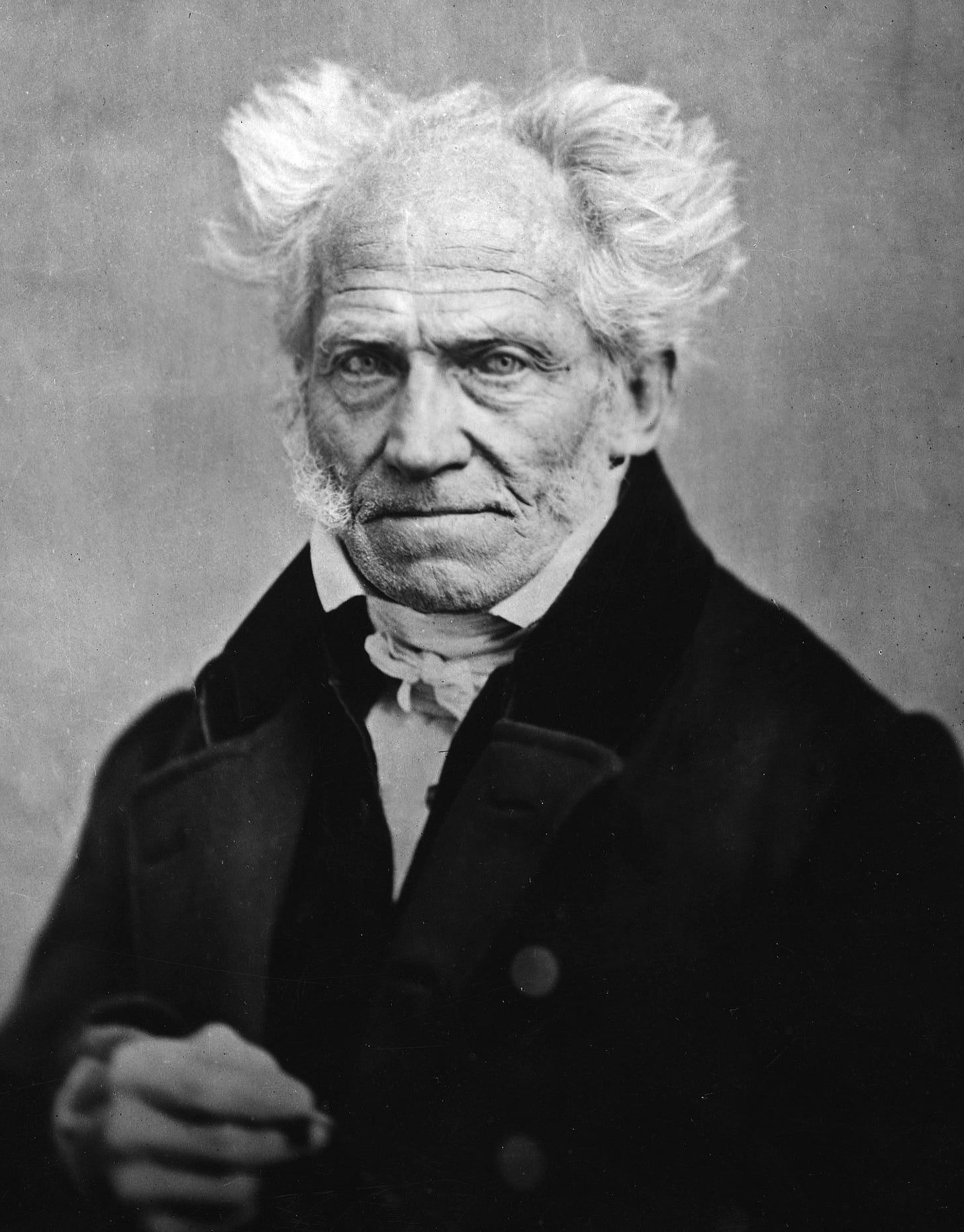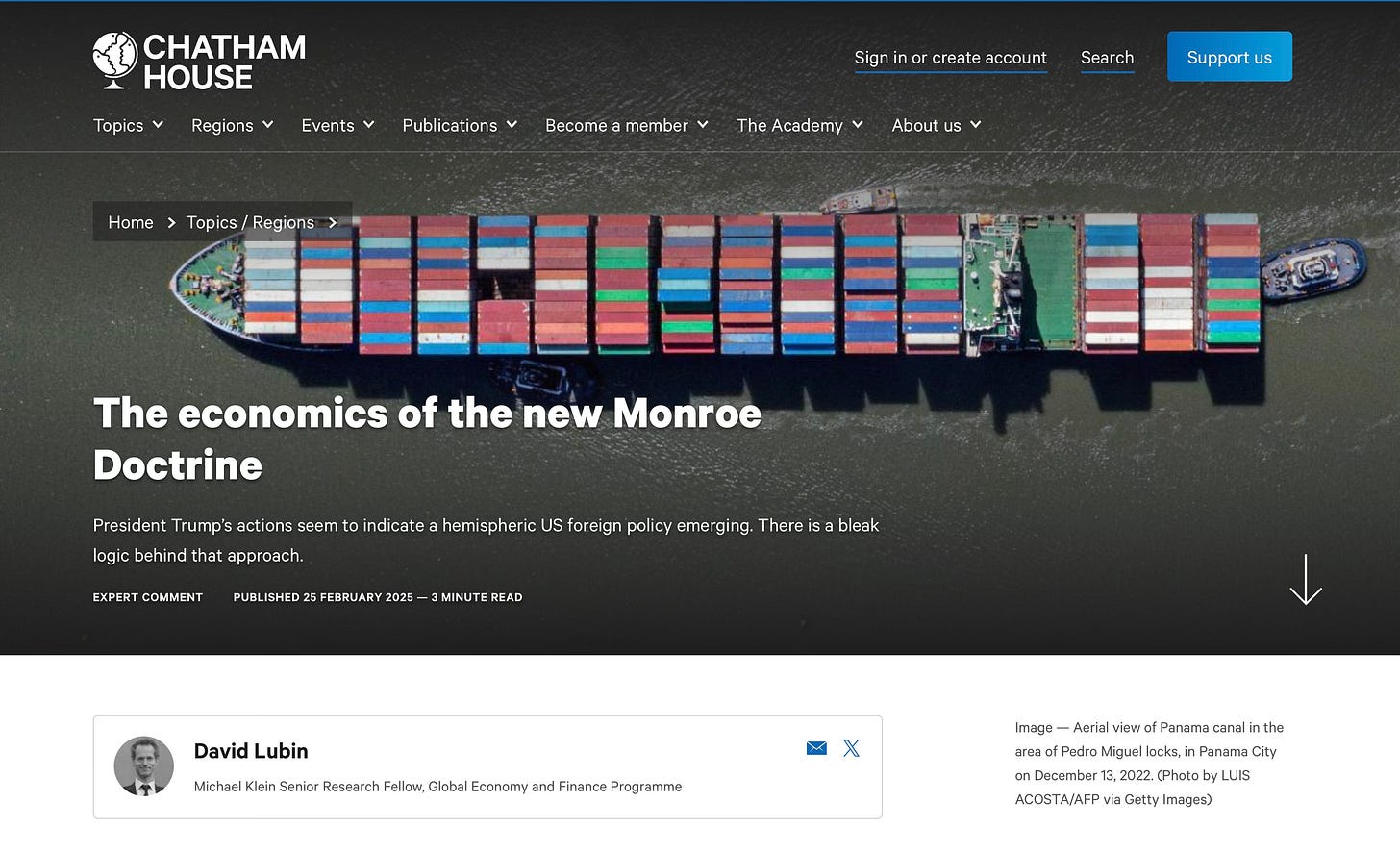Same hemispheric argument, different angle
I finally find a companion piece to my Americas-First analysis of Trump 2.0
Thomas P.M. Barnett’s Global Throughlines is a reader-supported publication. To receive new posts and support my work, consider becoming a free or paid subscriber.
When you operate out on the edge, as I do, of time (deep into the future) and domains (climate, demography) not typically associated with grand strategy, I get desperate at times for fellow travelers whose analysis makes me feel less like I’m a nut making all this stuff up and more like some respected analyst to whom deference (or, at least, the suspension of disbelief) is occasionally directed (perhaps even warranted).
That’s why I have stated here many times that the best reaction you can ever get from somebody (reader, audience member, correspondent, etc.) is that I’ve been making the same argument for years — just not as coherent and organized as you.
At first blush, that can seem like a left-handed compliment: Oh! Isn’t it nice you finally figured out what I’ve known all along!
But that’s the wrong way to look at it.
You don’t want All of this is like a revelation to me! as much as you want Finally! Somebody else gets it!
Yes, at its core, all such reactions are self-validating (What I’m peddling makes sense to them!), and I love turning somebody on for the first time to these ideas, but it’s more satisfying when you find those fellow travelers. It’s like you’ve been on this wilderness trail all by yourself for hours (something I used to do all the time), trying to find this one amazing location, and you’re not sure you’ll ever find it until … somebody else pops up on the trail and says, Hey! By any chance are you looking for X? And you’re like, Yes! Together we may actually find our way there!
I gotta admit: I conceived of America’s New Map at the end of 2021, wrote it across 2022, and published it in 2023. At no time in the process did I ever feel like hedging anything in case Trump returned to power. That’s not because I didn’t think it was possible — anything but. It was just more that I couldn’t foresee writing anything that would capture what he was up to (seemingly always a mystery, per his tactics).
No, I didn’t have any great sense of anything better with a potential Biden II or whomever might succeed him among the Dems. I really felt like I was writing for 2-3 presidencies down the road — a scope I’m fine with because it gets past all the personal animosities that dominate our political discourse today. Plus, I don’t care to come up with “grand strategy” that’s only good enough for today’s op-ed column and maybe a couple of weeks into the future, or until I feel the need to gin up another one (the difficult path of being a syndicated columnist as I once was: either keep harping on your through lines [bouncing the rubble] or make up something new every other week).
[Admission: that sense of bouncing the rubble (bombing past the point of any utility) scares me more than almost anything in this world, for it is the death of creativity.]
How you thread that needle between getting too stiff or being too flexible is … a good question.
My best answer? Stick with key principles and inevitabilities, but be entirely open and responsive to new developments or characters acting seemingly out of character.
I always think back to this one character on LA Law (Douglas Brackman Jr., played by Alan Rachins), the 1980s legal drama on NBC. He was the office whip who always had to crack down on everybody, so everybody disliked him (including the audience). When the last remaining original partner got ready to retire, this manager type put his hat in the ring (his deceased dad, senior, had co-founded the firm), hoping for the old man’s endorsement, which he did not give. The old guy said, You’re just not the right temperament for this job. In reply, our man said, That’s because you’ve never given me the chance to be anything but, or chosen to view me as anything but, the hard-ass office manager!
In effect, the guy was saying, don’t assume something isn’t there just because you never asked for it to be there (much less looked for it to be there).
That struck me as a huge lesson in life. I always say that I trust everybody to be exactly who they are. That approach keeps down the shock factor (I had no idea!) but does not eliminate the surprise factor (And then, to my surprise, they totally stepped up and did fine!). I have found that suspending my distrust wherever possible often pays off nicely: people surprise me pleasantly instead of shocking me unpleasantly — all because I give them a chance to prove me wrong.
I followed that logic in my marriage, my parenting, my coaching, and throughout my work career, and I am pleasantly surprised more often than rudely shocked. I just find that all I really need to do is wait for it … wait for it … wait for it … [H/T my oldest friend Scott Gilbertson]
Because people will surprise you.
I have often stated here that, if you want to think in grand strategic terms, you’ll always be uncomfortably ahead of the curve. People will think you’re a flake, then perhaps a danger, and finally they’ll see you as harmless once what you predicted came true and became so obvious that ANYBODY could have seen it.
Duuuuuuuuuuuuuuuuh!
You know my go-to quote on this:
"All truth passes through three stages: First, it is ridiculed; second, it is violently opposed; and third, it is accepted as self-evident".
Arthur Schopenhauer (1788-1860)
Thus, anticipation is everything for the grand strategic thinker, and, to hedge on your ego, you tend to put things out there a bit farther into the future than you expect them to happen because you know that, if you follow that fail-safe advice, someday you’ll end up like Leon Trotsky, the Marxist revolutionary whose vision was so far sighted than none of his predictions ever came true — the ultimate proof!
The older I get, the less in a hurry I am, and that entropy creeps into my analysis. I find myself constantly relaxing my timelines, especially when the friction (e.g., anti-immigrant fervor today) overwhelms the underlying force (e.g., climate-driven migration).
You know, that How can you even talk about X when Y is going on?
So, when Trump won, I really worried that my book and my current state of thinking was completely wiped out. I mean, Trump being open to expanding the United States? Are you nucking futs?
And then it started happening. Sure, it’s all still early enough to be dismissed as his personal fantasy, his usual negotiating tactics, etc., and yet, whether he’ll ever admit it or not, Trump has started paddling down the river I call North-South integration.
And yeah, that is VERY exciting to me.
Why?
Going to parochial school as a kid in the late 60s and early 70s, I felt like I was always being shown these scary educational films depicting this or that looming disaster (nuclear war was the fave), disease (elephantiasis ruled my nightmares), pestilence (locusts!), over-population (have I ever mentioned my fascination with the movie Soylent Green?), and/or the ever-deepening have/have-not divide that was mostly North-South in nature.
[Conversely, even as a child, I was almost mystically drawn to the logic of the Group of 77, the Non-Aligned Movement, and the campaign for a New International Economic Order (NIEO), which … yes … tells you something about how weird I was as a kid — as in, the things you worry about, man!]
Those films deeply disturbed me, and, with the nuns working me over like they did, the combined effect was to make me pretty damn scared about the future — hence my refuge every weekday at 4pm in Star Trek reruns. I just needed to know that this would all work out cause … man! Nobody had anything good to say about the future — as if we’d make it there anyway!
[Confession: I am binging my way through the entire Saturday Night Live archive of shows right now. It will take me four years, I estimate, and that’s exactly how long I’ll be in need of its services.]
So, here’s my internal tension right now, which I have hinted at many times already and have sought to work out in various posts: What if Trump is — unfortunately — the answer?
What if he, despite all the negatives and all the damage he will do, is necessary to push America toward the Progressive Era I know it needs, either because he moves the ball himself or he blows up the entire playing field.
[And yes, I recognize the temptation here to give into the Stockholm Syndrome.]
Here’s where we once again bump into that Big Bang logic that I ascribed to the Bush people on the Iraq War: Topple Saddam and on that basis set the entire region on the path of destruction/rebirth. If we do the postwar right, then we’ll set in motion the shining example, and, if we get it completely wrong, we’ll scare everybody else into the same progress out of fear that they’ll be next!
Bottom line: we can’t lose no matter how much we fuck things up.
That is HARSH. That is deeply cynical. And that is uber-realist.
It also describes the Neo-cons in a nutshell when it came to Iraq.
But this logic also coincides with my mantra from The Pentagon’s New Map: speed the killing. If it’s got to happen, then do it fast because doing it slow is worse.
Now, understand, that is the scary logic of every revolutionary force in human history. Hitler, Stalin, Mao … they all sped the killing because they all wanted supreme change.
Trump wants to speed his version of the killing — the destruction of the administrative state that hampers him as BUILDER and the destruction of America’s global obligations to world order that likewise cramp his vision for a “greater America” — however achieved.
So, when Trump starts up with all this expansionistic rhetoric targeting the Western Hemisphere, I take note. I may have assumed this was a 20-to-30-years-down-the-road logic too intimidating and daunting for any present-day leadership to radically entertain — much less accept, but I am often surprised by how much history moves faster than I expect/anticipate /fantasize about.
Mind you, I don’t know — and nobody knows right now — whether there is a potential high road for Trump to start us on and perhaps even move us along for some significant distance. Given all we know about the man, it seems far safer to assume the low road will ensue, meaning we’ll need the burn-down to proceed before our phoenix (Progressivism) can arise from its ashes.
But … there it is … the theoretical suddenly being spoken of in real terms, eliciting real emotions (We hear you, Canada!), and so on.
I learned long ago that I love having a life and a career within which headlines matter — as in, when the world suffers, I suffer, and when the world thrives, I thrive.
That, to me, is the great blessing of non-wealth — that lack of insulation. Can you imagine living through all this without a care in the world? I mean, what’s the point of that existence? Why bother?
Anyway … that is one long preamble, which tells me that I really needed to write that for myself before I could turn to the article that triggered this post.
Just so everyone can read it on their own, here it is:
Keep reading with a 7-day free trial
Subscribe to Thomas P.M. Barnett’s Global Throughlines to keep reading this post and get 7 days of free access to the full post archives.





